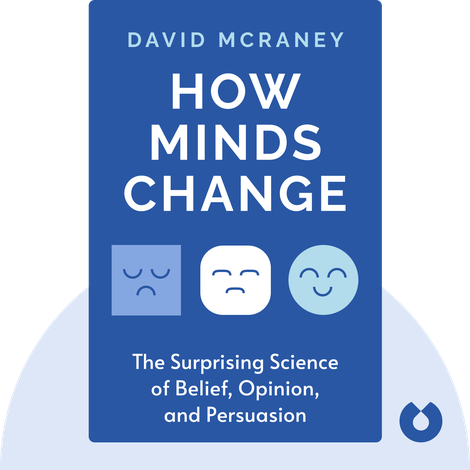Introduction
In the realm of financial coaching and personal development, understanding the intricacies of belief and persuasion is crucial. As I guide my clients toward financial freedom and a rich, fulfilling life, I constantly explore new strategies to influence and inspire positive change. Recently, I delved into David McRaney’s book, “How Minds Change: The Surprising Science of Belief, Opinion, and Persuasion.” The insights I gained from this book are fascinating and profoundly practical. In this blog post, I will share seven critical lessons from McRaney’s work illuminating the path to changing minds and influencing beliefs.
1. Experience Trumps Argument
One of the most striking lessons from McRaney’s book is the idea that personal experiences have a far more significant impact on changing beliefs than logical arguments. This resonates deeply with my own experiences as a coach. I have seen time and again how a single transformative experience can shift a client’s perspective more effectively than any amount of reasoning or evidence. Experiences are emotionally charged and memorable, making them powerful catalysts for change.

In my coaching practice, I strive to create experiences that challenge my clients’ existing beliefs about money and success. Whether it is through immersive workshops, real-life success stories, or hands-on financial exercises, these experiences can spark profound mindset shifts. The key is to make these experiences relatable and impactful, aligning them with the client’s goals and aspirations.
2. The Power of Priming
Priming is another fascinating concept explored in “How Minds Change.” Priming involves the subtle activation of certain associations or memories, which can influence our thoughts and behaviours without our conscious awareness. McRaney explains how our attitudes and beliefs can be shaped by these subtle cues, often in ways we do not even realise.
In the context of financial coaching, priming can be a powerful tool. By carefully designing the environment and language used in coaching sessions, I can subtly influence my clients’ attitudes towards money and success. For example, using positive and empowering language, displaying success stories, and creating a supportive atmosphere can prime clients to adopt a more positive and proactive mindset.
3. The Importance of Social Identity
Our beliefs and opinions are closely tied to our social identity and group membership. McRaney emphasises how we tend to adopt and defend the views of our ingroup while rejecting those of our outgroup. This understanding is crucial for anyone looking to influence others, highlighting the importance of social context and group dynamics.

In my coaching practice, I pay close attention to the social identities of my clients. Understanding their backgrounds, affiliations, and social networks helps me tailor my approach to resonate with their sense of identity. By aligning financial advice with their values and the norms of their social groups, I can foster a sense of belonging and acceptance, making it easier for them to embrace new beliefs and behaviours.
4. The Role of Emotions
Emotions play a central role in belief formation and change. McRaney illustrates how we often rationalise our emotional responses and seek out information that confirms our feelings. This emotional bias can be a barrier to change but can also be leveraged to facilitate it.

As a coach, I recognise the power of emotions in shaping financial decisions. By addressing the emotional aspects of money, such as fear, guilt, or anxiety, I can help clients overcome these barriers and adopt healthier financial habits. Techniques such as mindfulness, visualisation, and emotional resilience training are integral to my coaching toolkit, helping clients navigate their emotional landscape and align their financial behaviours with their goals.
5. The Influence of Confirmation Bias
Confirmation bias is the tendency to seek out information that confirms our existing beliefs and dismiss information that contradicts them. McRaney delves into how this bias can entrench beliefs and make it difficult to change minds. Understanding this bias is essential for anyone looking to influence others.
In my coaching practice, I encounter confirmation bias frequently. Clients often have preconceived notions about money that can resist change. To counter this, I use a combination of gentle questioning and evidence-based strategies to challenge these beliefs. Encouraging clients to explore alternative perspectives and providing them with compelling evidence can gradually chip away at their confirmation bias, opening the door to new ways of thinking.
6. The Power of Storytelling
Stories are a powerful tool for changing minds. McRaney highlights how stories can create an emotional connection, making information more relatable and memorable. This is a technique I have found incredibly effective in my coaching practice.

Sharing success stories of clients who have achieved financial freedom can inspire and motivate others to follow suit. These stories provide a tangible example of what is possible, making the abstract concepts of financial planning and wealth-building more concrete and attainable. By weaving these stories into my coaching sessions, I can create a narrative that clients can relate to and aspire to emulate.
7. The Need for Empathy and Understanding
Finally, McRaney emphasises the importance of empathy and understanding in persuasion. To effectively change minds, we need to understand the perspectives and emotions of others. This builds trust and creates an opening for meaningful change.

Empathy is at the heart of my coaching approach. By deeply listening to my clients and understanding their unique challenges and aspirations, I can tailor my advice to their specific needs. Building a robust and empathetic connection fosters trust and makes clients more receptive to new ideas and strategies. Through this empathetic approach, I can guide clients towards lasting financial freedom and fulfilment.
Conclusion
David McRaney’s “How Minds Change” offers invaluable insights into the science of belief, opinion, and persuasion. These seven lessons—experience trumps argument, the power of priming, the importance of social identity, the role of emotions, the influence of confirmation bias, the power of storytelling, and the need for empathy and understanding—provide a comprehensive framework for influencing and changing minds.
As a financial coach, these lessons have profound implications for my practice. By integrating these insights into my coaching strategies, I can more effectively guide my clients towards positive change, helping them achieve their financial goals and lead more prosperous, more fulfilling lives. Understanding the science behind belief and persuasion not only enhances my ability to influence others but also deepens my empathy and connection with my clients, ultimately fostering a more supportive and transformative coaching experience.
The author of this article, Taresh Bhatia, is a Certified Financial Planner® and advocate for female empowerment. For more information and personalized financial guidance, please contact taresh@tareshbhatia.com
He has authored an Amazon best seller-“The Richness Principles”. He is the Coach and founder of The Richness Academy, an online coaching courses forum. This article serves educational purposes only and does not constitute financial advice. Consultation with a qualified financial professional is recommended before making any investment decisions. An educational purpose article only and not any advice whatsoever.
©️2025: All Rights Reserved. Taresh Bhatia. Certified Financial Planner®
Subscribe Now for Upcoming Blogs!
[convertkit form=6555951]
📢 Join free live webinar —
Couple Finance Formula™ Register here




